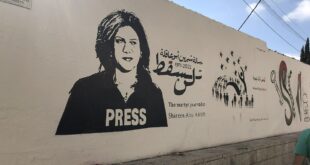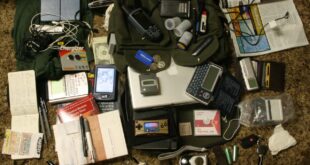The US presidential election of 2004 attracted an unprecedented amount of international media attention, perhaps nowhere more so than in the Arab world, where the impact of American policy has made itself acutely felt in the three years since September 11. Concerns over the war in Iraq, combined with frustration over America's "War on Terror" and continued US support for the Israeli occupation of the Palestinian territories, has contributed to a heightened awareness among Arab audiences that what happens thousands of miles away in America affects them at home. Arab satellites reflected this increased interest in US politics and the American democratic system by offering a plethora of talk shows, documentaries, call-in programs, special reports, and live coverage of the entire elections process, starting with the Democratic primaries and continuing all the way through the conventions, debates, and the all-night marathon of Election Day itself. TBS Deputy Managing Editor Lindsay Wise and TBS Editorial Assistant Usama Najeeb spent the weeks leading up to the election glued to the television screen, monitoring Arab satellite coverage of the US elections. This is their take on what they saw.
One of the most noticeable aspects of Arab satellite TV election coverage was the presence of numerous weekly or daily talk shows focused on US politics and the presidential campaigns. As the established veteran on the scene, Al Jazeera provided the most extensive and regular coverage of the race for the White House. The channel adapted its usual US affairs program, Min Washington, or From Washington, to spearhead coverage of the elections. Hosted by Al Jazeera's Washington bureau chief Hafiz Al Mirazi (see Wise's interview with Al Mirazi in this issue), the political talk-show program started its coverage of US elections in January, but was integrated about one month before election night into a new program called Sibaq al-Ri'asa al-Amriki, or The American Presidential Race, also hosted by Al Mirazi and another Al Jazeera moderator, Mohammed Al Alami. This show followed election news at a level of great detail within the context of American domestic and foreign affairs. It was broadcast once a week live and twice as a rerun later in the same week.
Each episode of The American Presidential Racefeatured short reports from correspondents in the field, using them as launching pads for discussion between the host and guest speakers, who included activists and policy makers from both parties, journalists, Arab Americans, pollsters, and academics, as well as the mandatory assorted pundits and analysts. Some of the more prominent guests included Pulitzer Prize-winning reporter Seymour Hersh, third-party candidate Ralph Nader, ABC news anchor Peter Jennings, and Dennis Ross, Middle East policy coordinator under President Clinton. The show also fielded brief phone calls from audience members, both inside and outside America, commenting on the race and asking questions of the guests. Like other weekly shows in the same mold that appeared on other channels, Al Jazeera's program aimed to educate its audience about details of the US political system, explaining the complex concepts and history of the Electoral College, the two-party system, and the importance of campaign strategy in "battleground states" like Ohio and Florida. It also included discussions of the polls and public opinion surveys hosted by different poll centers and media organizations, ranging from Time magazine, FOX NEWS, CBS, CNN, Zogby International, and the Gallup Organization. Such polls were discussed thoroughly with commentary and analysis, speculating on the reasons for each candidate's rise and fall in popularity, and discussing how and why they succeeded or failed in selling their messages to voters.
Every episode also had a theme. One episode, for example, discussed the role played by the American media in framing the issues and candidates for voters, while another debated whether people would vote for Kerry just because he was not Bush. Another discussion centered around poll results that showed a decline in America's popularity around the world, even among its allies, and examined the reasons for this decline and whether it would affect the race, while still other episodes focused on Americans' image of Muslims, whether religion is a major factor affecting the way Americans vote, the Patriot Act, fears about fraud connected with the use of new computerized balloting machines, the consequences for the region in the case of a Bush or a Kerry victory, and Bush's talent for keeping his message simple and direct, thereby inspiring trust in some voters while alienating others.
One notably common theme on Al Jazeera and Arab satellite coverage in general was the role of Arab-American and Jewish-American voters in the elections, with guests complaining about the absence of an effective Arab lobby to challenge the perceived dominance of the Jewish lobby. Arab Americans and pollsters came on air to interpret results of surveys polling the US Jewish and Muslim communities, and to speculate about what kind of impact sizeable Arab-American communities in battleground states like Ohio and Michigan might have on elections.
In a departure from the more confrontational Crossfire-type programs like Bidun Hudud and Al-Ittijah al-Mu'akis, Al Jazeera's From Washington and The American Presidential Racehad a distinctly educational and informational style, designed to help viewers newly interested in American politics easily understand what was happening in the US and grasp the basic workings of the American democratic system in the context of the country's history, laws, and constitution. The coverage was impressive in its scope and depth, though it did not always give sufficient weight to domestic issues and demographics, focusing more, perhaps naturally, on foreign policy and the interests of the Arab-American and Jewish-American communities. This may, however, have skewed the perceptions of some viewers about the influence of these issues and groups on the outcome of elections, while skirting hot "moral values" topics like abortion and same-sex marriage, which, it turns out, may have helped turn the elections in Bush's favor.
Many other satellite channels offered weekly programs in a similar format to Al Jazeera's American Presidential Race. Especially as Election Day drew near, it seemed nearly every channel, including entertainment channels such as Lebanon's LBC and Egypt's Orbit TV, as well as Hezbollah's Al Manar and American-funded Alhurra, were producing special coverage on the US race, and naturally every political talk show on the air in the final weeks touched on election issues. For the most part, however, the majority crammed their in-depth and intense coverage into the final weeks and days before the elections. Other than Al Jazeera, the only special coverage that truly stood out was that of Al Arabiya and Abu Dhabi TV channels.
Relative newcomer Al Arabiya offeres a competing weekly show, Abr al-Muhit, or Across the Ocean, hosted by Hisham Milhem. Like From Washington, Across the Ocean usually is broadcast as a US affairs program and aired live once a week, later to be repeated twice a week as a rerun. Across the Ocean also has a familiar format that featured interviews with American analysts and themed discussions about US elections issues, as well as looking at Arab Americans living in the US and the issues confronting them, but its coverage was slightly weaker than Al Jazeera's in that it did not go to the same lengths to provide detailed explanation and orientation. Al Arabiya did, however, bulk up its coverage by relying on numerous documentaries about the elections and American political trends; though these documentaries were informative, they sometimes were short on analysis or historical and social context. One documentary about the American political scene, for example, was produced in English with Arabic subtitles and featured an almost random collection of American voices talking about a variety of issues in the US political arena. Without a narrator to tie the piece together and without a balance of voices (the vast majority were leftist), the documentary provided a necessary forum for activists and thinkers who do not usually find the spotlight in mainstream American media, but without anchoring it with the context and perspective necessary to help Arab audiences interpret what they were watching. Otherwise, the documentary style of coverage offered on Al Arabiya could be a useful educational tool, enabling comprehensive looks at specific issues, from profiles of the candidates to a discussion of neo-conservative ideology in US politics.
Abu Dhabi TV, which recently distinguished itself with its coverage of the Iraq war, had its election coverage preempted by the death of the president of the United Arab Emirates, and ruler of Abu Dhabi, in the week of elections itself. Leading up to elections, however, Abu Dhabi covered US politics in its daily international affairs program Al Madar or The Circuit, hosted by Jasim Al Azzawi. Al Madar deals with some of the most sensitive issues and topics in the world, including Iraq, Iran, Palestine, Afghanistan, and Korea. Its primary advantages were that it was daily, insightful, and in depth. The program hosts several guests per episode via satellite and receives questions by email that are subsequently addressed on air. Presenter Al Azzawi is a tough interviewer who asks refreshingly critical questions, but sometimes he appears to resort to leading questions, using the interview as polemical tool.
Abu Dhabi also presented a weekly program hosted by the president of the Arab American Institute, James Zogby. Titled Viewpoint, the program was in broadcast in English but subtitled in Arabic. Viewpoint examined the American media as a mirror of American politics, as well as of Americans' perspectives on Arab issues. Each episode featured three or more guests and allowed time for lots of phone calls from viewers. More than other shows, Viewpoint addressed the problems and shortcomings of American democracy, specializing in US policy in the Middle East and elsewhere. The primary advantage of the program was that its host enjoyed a certain credibility as an Arab American. This gave the viewers, whether American or Arab, a reason to keep following the program and the analysis it offered. Side by side, these two programs offered exemplary coverage of the US elections, addressing issues on both the regional and international level. It is also noteworthy that no other channel offered more coverage of the US elections than Abu Dhabi, as measured by hours per week. From this perspective, it provided the best coverage by a state-owned TV station. Abu Dhabi TV has undergone major reform recently. The result seems to be more objective and diversified reporting.
Apart from the detailed information, background, and analysis provided by weekly specials, perhaps one of the most impressive aspects of Arab satellite election coverage was the sheer amount of time and resources devoted to live events. Al Jazeera and Al Arabiya both covered all the debates in real time, with voiced-over instantaneous translation into Arabic, while Al Jazeera also aired thirteen hours of live broadcast for each of the Democratic and Republican party conventions in Boston and New York, giving more air time to these events than the combined coverage of America's major terrestrial TV networks CBS, NBC and ABC. Although the time difference meant that this live coverage took place late at night in the Arab world, highlights were rerun later on the daily news and weekly talk shows, where they were picked apart and evaluated. Audiences were orientated to these events in the form of special reports leading up to the event. Prior to the debates, for example, viewers were prepared through discussions on the weekly election specials, during which they were educated about the history of the American presidential debates and their evolution on television, how each of the candidates was readying for the confrontations, and how the two parties negotiate on the strict rules governing the debates themselves. Analysts also discussed the nature of the questions asked in the debates and whether the tightly controlled environment in which these questions are asked weaken the events' effect on voters. Analysts and pundits predicted the main themes and questions of the debates and speculated on which candidate would benefit from different possible scenarios.
In the case of the conventions, viewers learned about the rallying role played by these traditional as well as symbolic events, as candidates try to broaden and strengthen their support bases. During the live coverage of the conventions themselves, Al Jazeera's reporters interviewed delegates and politicians from both parties, although the network ran into some problems with the Democratic campaign when their pre-approved banner was removed from their skybox in Madison Square Garden. Al Jazeera's producers and reporters also found that the Democrats' media relations staff was less communicative and helpful than the Republican communications staff in setting up interviews. Al Mirazi speculated that this might have to do with a lack of experience with international media on the part of the Kerry campaign, or perhaps reflected a fear of being dubbed soft on Arabs, and consequently soft on terror. Interestingly, Al Jazeera's problems with the Kerry campaign at the convention reflected a lack of access that persisted, according to Al Mirazi, throughout the elections.
One of the biggest tests for Arab satellite coverage of the US elections was their performance on Election Day itself. Many Arab satellite channels advertised some form of live coverage on November 2 and 3, although UAE channels were preempted by the death of UAE president Sheikh Zayed Bin Sultan al-Nahyan on November 2. Al Jazeera and Al Arabiya delivered live, all-night, wall-to-wall news analysis and election returns starting around midnight Cairo time on November 3, although of course both channels led with elections news throughout the day during regular headline bulletins and reports. On the night, however, they both fell a little short. Despite the presence of some very articulate and knowledgeable analysts, Arab satellite channels seemed to be a beat or two behind the Western channels like CNN, BBC and EuroNews, both in the sense that they were not as quick to declare winners in different states, and in their occasional mistakes, such as coloring Virginia blue for Kerry when it had really gone to Bush. This last example happens to come from Al Jazeera, where it appeared someone had mistaken Virginia for her northern neighbor Maryland, which went, not surprisingly, to the Democrats fairly early on. Such a snafu is not only embarrassing but misleading for viewers flipping from channel to channel, since a glance at the map made it seem as though Kerry had hugely upset Bush in a key Republican state.
Although there still seem to be a few kinks to iron out, the fact that there is room for improvement should not detract from the overall effectiveness of elections coverage on Arab satellite TV, which offered viewers a valuable range of sources and choices. It provided an important service for Arab audiences, who were given most of the tools and information they needed to interpret what they were watching unfold on their television screens. And while most Arab satellite TV viewers may have felt they were in the frustrating position of watching the election of the international superpower's "president of the world" without having a vote, the estimated 200,000 Arabic-speaking US citizens were exposed to a unique new forum for debate and source of information about their country's democratic process. In recognition of this situation, a political ad aimed at Arab-American voters even appeared on Al Jazeera. Funded by ArabsVote.org, a non-partisan organization, the ad showed images of English-speaking Arab-Americans encouraging Arabs to speak up and vote on Election Day.
Although the majority of Arab satellite viewers did not have a say in the results come November 2--many in fact felt there was little real difference between the candidates and little real hope that November 3 would bring real change to the Middle East--the long-term effect of such a competitive and energetic civic education about democratic processes abroad has yet to be seen. Despite most Arabs' disappointment at Bush's win, the increased intensity of US political coverage on Arab satellite TV may eventually lead to a greater democratic awareness and improved understanding of American life, politics, and society. "It is part of a slow process that is very cumulative," said Abdel Monem Said, director of the Al-Ahram Center for Political and Strategic Studies. "Ten years down the road, maybe there will be a growing appreciation in the Arab world for democracy and the market economy. America is the purest case you can find of these processes, and on a very grand scale. In the Arab world, all the ways of life are not working, and it is about time we changed direction. When the Arabs come closer to realizing this is what they want to do, they will understand America more."
In the meantime, Arab satellites are moving quickly on to the next headline-making event. It will be interesting to watch and see how much time and effort satellite channels will devote to coverage of the Palestinian and Iraqi elections scheduled for the coming months, and whether the techniques and methods learned and honed during the US race will apply to coverage of elections in the Arab world's own backyard, regardless of whether they are as close or as controversial as Bush-Kerry 2004.
 Arab Media & Society The Arab Media Hub
Arab Media & Society The Arab Media Hub




